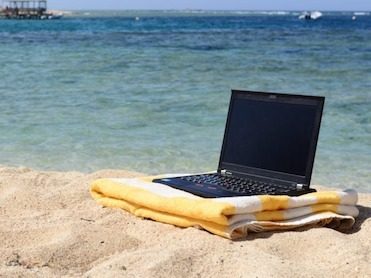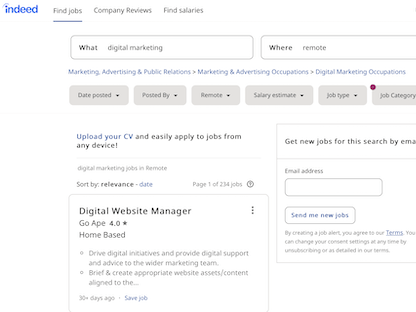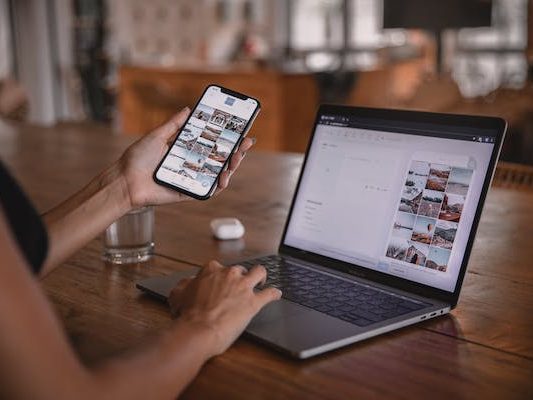As an avid traveller, something that’s always appealed to me was the idea of working remotely; the ability to work anywhere in the world! This would allow me to work whilst I travelled and to live wherever I wanted whilst doing so.

With the rise of the pandemic, remote working has exploded and has opened up opportunities for even more people. But how do you get started and what job roles can you hope to get?
How to get started
Working remotely is all about your skillset. Can you provide a service for someone, or offer your skills to someone in an online environment? Answering that question with a yes is what you’re aiming for.
If you already have a skill that can be applied in an online-only environment then you’ve got a great starting block, as you can skip straight to the “application” process.

Skills/jobs that might allow you to work remotely will be mentioned later on when I go over which job roles are best suited to working remotely, so stick around!
If like many of us, however, you don’t yet have a developed skill that could be used to earn an income solely online, you’ll need to start with learning. Thanks to the internet there are so many ways you can do this now, from free resources such as YouTube, blogs and open software, to paid courses, learning platforms and even online degrees and qualifications.

Choosing which field you want to work in will determine which level of education you might want to achieve. For example, a web designer or marketer may need full qualifications and proven test results in order to create a successful income stream, whereas a photographer, copy writer or graphic designer may just need to develop a portfolio of work to show to customers and clients.
Some of the best platforms to gain knowledge on are:
If you’re looking for a certification or full qualification look at:
University websites
Institutes in your chosen field
Your next step is to begin applying or building your online presence. If you want to go for the potentially easier, more traditional route of working a standard, full time job then you’ll want to look out for job ads and begin writing to companies. Use popular online job boards such as Indeed, Reed and TotalJobs (or whichever happened to be the most used in your country) and search for remote openings.
A tip for finding jobs on these platforms is to search for whichever position you’re looking for but set the location to “Remote”, which will bring up more relevant results that include Remote working in the job description.

Another great method for finding work is simply to reach out to companies yourself. Create a motivational letter, an outstanding CV and offer them your services to see if they’d employ you. Be prepared for a hefty turn-down rate, but with enough emails sent, opportunities will eventually arise!
An alternative method for sourcing remote work is to freelance and offer your services to a range of potential clients. Although slightly harder to begin with, working for yourself can bring significant benefits if you’re wanting to work and travel the world.
First and foremost, it will give you the flexibility of working when you want (and need) to – something that a full time, permanent position is unlikely to offer. This is great for being on the road as it allows you to free up time and move around far more spontaneously.

Freelance work also allows for more flexibility with your earnings; it has more potential for scaling up as you become more experienced, and it also allows you to earn more and less each month as suits your needs. After you’ve gained a lot of experience in your field, you’ll be able to work with larger, higher paying clients allowing you to earn more whilst working less – and who doesn’t want that?!
Again, the flexibility to earn more or less in certain periods ties in with your ability to work more/less when you want, rather than having to fulfil contracted hours each and every week.
As you can see, freelancing definitely has its benefits for travellers, over regular paycheck jobs. However it’s up to you to decide if the extra risk is worth it, or if you’d prefer the security of a full time employed position.
So what jobs can you work remotely?
There are a wide range of jobs that you can perform remotely, as long as you have a computer and an internet connection. Here’s a list of the main ones to look out and prepare yourself for, if working wherever you want is something that appeals to you.
I’ll go over each of these in more detail in a later post, but for now, here’s a small intro to each that will give you a rough idea of what it’ll involve.
Copywriter

A copywriter is somebody who writes for others. Whether for other individuals or for businesses, they create texts for all sorts of things: websites, blog articles, email newsletters, adverts, brochures. Pretty much anything you can think of that involves text (known as copy) online, you can write for others as a copywriter. Due to the nature of the job, this is most likely going to be freelance work.
Virtual Assistant
This is pretty much what it sounds like – you’ll be working as an assistant for someone, in a virtual environment. It involves carrying out a wide range of online tasks such as writing and responding to emails, creating and maintaining schedules, booking appointments and other small tasks such as website updates or social media updates. You may find this as a full-time position or as freelance work, working for various clients.
Digital Marketing/Social media manager

As an online marketer or social media manager, your role will be to create marketing and social media campaigns for businesses and/or clients. This includes creating social media campaigns, running paid advertising and creating email marketing campaigns. You’ll usually need to have some kind of marketing qualifications to show your expertise. Again, you’ll usually be able to find a lot of full-time positions as a digital marketer, but you can also operate on a freelance basis, working with a range of clients that you choose.
Graphic design
Graphic design in another fairly obvious one – you’ll be creating things like graphics, logos, images, brand designs and more. If you want to become a graphic designer, you’ll need to become proficient in using things such as Adobe Illustrator and Photoshop and you’ll need a good body of work and possibly some qualifications if you’re looking to secure a job. You’ll find a good deal of full-time jobs as well as freelance opportunities as a graphic designer.
Website builder/designer
Web designers and website builders vary slightly in what they do, however as they’re similar I’ve put them together here. A web designer will create a website from scratch using large amounts of customised code. They’ll often be more advanced, complex and expensive. You’ll be able to find work in the form of a full-time job or as a freelancer.

A website builder usually creates more simplistic websites using web builders and templates. As they require less work and knowledge, they’re also cheaper so you won’t be able to demand as much, however you also won’t need to spend as long acquiring the skills as you would to become a website designer. You’ll want to look out for freelance work for this skill.
The last three jobs are somewhat different in that they’re all self-employment roles only and they more so require dedication, development and self-promotion rather than hard qualifications or skillsets.
Photographer/Videographer
For this role you’ll need to make sure you’ve got appropriate equipment first, as well as the skills needed to produce work for clients/customers and the ability to promote yourself and your services online. The great thing about being a photographer or videographer is that you can use travel as your actual work – something that a lot of other roles don’t allow for. You can also work for clients around the world, creating videos or taking photos for businesses, for example creating property videos, or taking photos for small business marketing campaigns.
Online business
Creating your own online business is one of the best ways to “work” and travel the world – if you can build one successfully. It will take a lot of time and potentially financial investment for this and you will have to be patient and willing to take risks to make it work. However, if you do then the rewards are great. You’ll be able to scale the business to a healthy income as well as being able to delegate most of the work, leaving you with plenty of free time for your travels!
YouTuber/Influencer

This is essentially one version of the above method – by becoming a YouTuber or influencer you’re starting a business online. It will require a similar level of dedication, risk and investment of time before you can reap the rewards, however if you do, they’re easily some of the best any job can provide for a full-time traveller. Not only can you use your travels as the foundation of your content and work, but you’ll eventually be able to generate a somewhat passive income that will allow you to enjoy a wealth of free time!
Hopefully this intro to working remotely has given you some inspiration and starter points from which you can develop a fully sustaining remote career! There are many ways in which you can create a totally remote income and in 2021, it’s easier and more accessible than ever. I’ve touched on a few tips on how to start out, and which skills and roles are the easiest to develop online – keep an eye out for future posts where I’ll go over each aspect in more detail, giving you an actionable plan on how to work remotely from anywhere in the world whilst you travel!

1 Comment
bursa · March 1, 2021 at 8:05 pm
Pretty! This has been an extremely wonderful article. Thank you for supplying this info. Lind Aharon Eliza
Comments are closed.